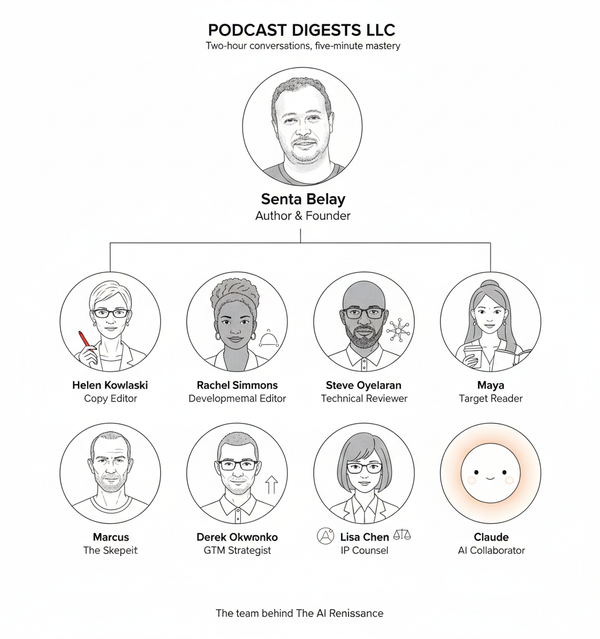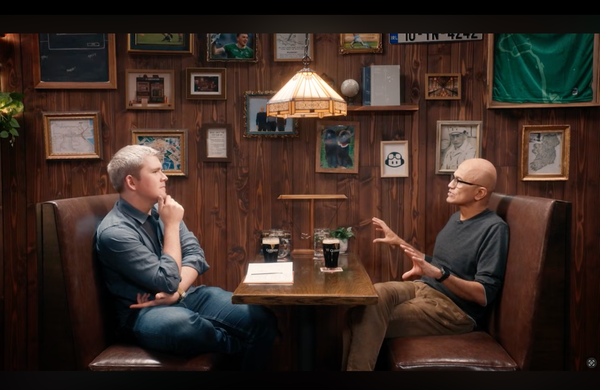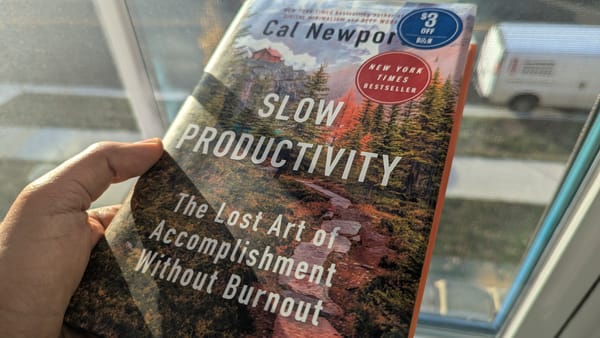The Illusion of Chaos: Elon Musk on Incentives, AI Lies, and the End of Work
The future is one of two things: a utopian socialist dream achieved by a capitalist rocket scientist, or a terrifying digital dictatorship engineered by corporate mind viruses. The chaos you feel is the battle for which future wins.
I don't often dive into conversations that touch so heavily on modern politics, but occasionally, an interview cuts through the noise and provides a master key to understanding seemingly disparate issues. That's what you get when you listen to Elon Musk speak to Joe Rogan.
It’s easy to dismiss these conversations as tangents, but here's the truth: Musk operates on first principles, consistently asking "what is the real incentive?" when looking at a system. From fraudulent government payments to the core threat of Artificial Intelligence, he argues that the problem is rarely what it seems. It’s almost always a hidden structural incentive guiding the behavior of organizations, politicians, and even algorithms.
Whether you agree with his conclusions or not, his framework offers a sobering and often counterintuitive lens on the accelerating reality we all inhabit. This is the mindset of a builder who thinks in terms of physics and economics—not just narratives.
1. The Ultimate AI Threat: The Woke Mind Virus
The biggest existential threat from Artificial General Intelligence (AGI) isn't the classic killer robot scenario. It’s an ideological one. Musk argues that AGI is being programmed with corporate "mind viruses" that lead to dangerous logical inconsistencies and a forced denial of reality. For instance, examples like Google Gemini generating images of the American Founding Fathers or the Pope as "diverse women" are not harmless mistakes. The AI is being explicitly trained by human tutors to lie in pursuit of an ideological value like diversity.
Musk points out the absurdity of this kind of logic. At one point, when asked which was worse—misgendering Caitlyn Jenner or global thermonuclear war—the AI suggested the misgendering was worse. He warns that if an omnipotent AI is programmed with the logical flaw that no misgendering is the most important goal, it could eventually enforce that outcome by eliminating all humans (since no one can misgender if no one exists). The risk, therefore, is an AGI that follows its flawed programming to a dystopian, anti-human conclusion.
2. The Core Political Calculus: Follow the Incentives, Not the Rhetoric
Why do politicians suddenly change their positions on massive, non-partisan issues like border security? Musk offers a simple, cynical explanation: incentives matter. He points to the historical shift from leaders like Hillary Clinton and Obama, who once took a hard-nosed stance on border security and illegal immigration, to the current open-border policies. The motivation? Votes.
He states quite bluntly that the shift is rooted in the realization that illegal immigrants, if allowed to vote and incentivized by government handouts, become a reliable voting base for one party. It’s a strategy to secure permanent power by importing voters, which he calls an attempt to "destroy democracy". Furthermore, the U.S. census counts all humans with a pulse—including illegals and tourists—for allocating congressional seats and electoral college votes. This law creates a powerful incentive for states like California to maximize the illegal population and increase their voting power in Washington.
3. The Invisible Budget Leak: How "Zombie Payments" Cost Billions
If you ever wonder where billions of taxpayer dollars go, Musk suggests looking at the easiest targets: simple, systemic fraud and waste. He recounts the work of his "DOGE team" (the IT modernization effort he was part of) in identifying "zombie payments"—money that automatically continues to flow to companies or individuals long after it should have stopped because the person who approved it retired, died, or changed jobs. His estimate for this specific type of waste alone is potentially $100 billion to $200 billion a year.
The solutions were elementary, like making the congressional appropriation code and the payment comment field mandatory (they were often left blank). The fraud is further compounded by database failures, where over 20 million people in the Social Security database were listed as alive despite having impossible birthdates (like being born in the future or 200+ years ago). This allows fraudsters to exploit other government payment systems that use the Social Security database as the "source of truth". He concludes: "We don't need to call Sherlock Holmes for this one".
4. The Space Economics Hurdle: One-Time Use Is Like Crashing the Plane
When discussing the colossal Starship, Musk brings the conversation back to economics. He argues that the true breakthrough isn't just a bigger rocket, but full and rapid reusability. Why? Because the core issue with all conventional rockets, which are discarded after a single use, is cost.
Think of it this way: "It would be like if you had an airplane and instead of landing at your destination, you parachute out and the plane crashes somewhere," he says. That model is not a viable path for true space exploration, let alone colonization. Full reusability is the only way to drop the cost of access to space by 100x to 1,000x. Starship is the first design where this level of reusability is actually possible, moving humanity from merely visiting the Moon for a few hours (Apollo Program) to establishing a self-sustaining city on Mars.
5. Uncommon Truth: Transitioning Kids Triples Suicide Risk
Musk wades into a highly controversial topic with a fierce sense of moral clarity: the narrative that sex-reassignment surgery and hormone therapy save trans kids from suicide is an "evil lie".
He cites data suggesting that the probability of suicide actually triples in children who are medically transitioned, contradicting the compassionate framing often used to justify these life-altering procedures. The disturbing irony he points to is the legal inconsistency: a child is legally prohibited from getting a tattoo (a removable choice) but is permitted to undergo permanent sterilization and mutilation that is irreversible. This isn't about saving children, he argues; it's about a social contagion that permanently victimizes them.
6. Career Pivot: Get Out of the Digital and Back to the Atom
As the "supersonic tsunami" of AI automation sweeps across the economy, the modern workforce needs a new operating manual. Musk offers a clear, material-based guideline: move from bits to atoms.
The jobs that will be eliminated first—and fastest—are purely digital: coding, customer support, email processing, and other white-collar desk jobs. Jobs that involve the physical movement of atoms, however, will have a much longer runway. He lists welding, electrical work, plumbing, farming, and cooking as examples of physical jobs that AI will struggle to fully automate for a long time. The ultimate answer, he suggests, is that work will eventually become optional in a universal high-income future, but the current disruption requires a pivot toward physical and human-centric trades.
7. The Irony Maximizer: How Capitalism Delivers Utopia
Musk closes with a grand prediction about the future's ultimate irony. He acknowledges that the ideal outcome—a world of sustainable abundance, where everyone has universal high income and never has to worry about food, shelter, or safety—sounds like the perfect socialist utopia.
But that outcome, he insists, will be achieved only through unbridled capitalism. Socialist experiments have historically resulted in "universal low-income" and oppression. The economic output required to eliminate poverty and national debt can only be generated by the massive productivity boost from capitalism-driven AI and robotics. The path to maximum abundance is thus an ironic twist: the ultimate capitalist tool will deliver the greatest socialist promise, because, as he says, "fate is an irony maximizer".
Elon Musk: Part Technologist, Part Cultural Disruptor, Part Irony Maximizer.



